how often do you exercisesectionB(1a-2c)人教版教案
人教版八年级上学期英语课件:unit 2 Section B(1a-2b)(共41张PPT)

5.How often do you eat junk food?
2 or 3 times a week
6.How often do you drink coffee? never
Bill hardly ever
Junk food is bad for our health.
1a Match the words with the pictures.
a
b
c
d
e
f
Check the answers!
1. __b__ junk food 2. ___a__ milk 3. __e___ fruit 4. __c___ vegetables 5. __f___ sleep 6. __d___ coffee
教学课件
英语 八年级上册 人教版
Unit 2 How often do you exercise?
Section B The Third Period 1a-2b
课前自主预习
1. 垃圾食品 __j_u_n_k__fo_o_d___ 2.对……有好处 ___b_e_g_o_o_d__fo_r_ 3.喝咖啡 _d_r_i_n_k_c_o_f_f_e_e_ 短语互译 4.去野营 __g_o_c_a_m__p_i_n_g_ 5.在某人的空闲时间
2.although conj.虽然;尽管;即使。引导让步状语从句。
Although/Though it was so cold,he went out without an overcoat.尽管天气很冷,但他还是没有穿大衣就出去了。 【注意】 although=though用作连词,意为“虽然,尽 管”,这两个词都不能与but连用,即用了although/though 就不能再用but。不过although可以与yet/still一起使用。 尽管他身体不好,但是他工作很努力。 正:Although/Though he is in poor health,he works hard. 正:He is in poor health,but he works hard. 误:Although he is in poor health, but he works hard.
八年级上册英语Unit2 Section B(1a-2b)课时练习(含答案)
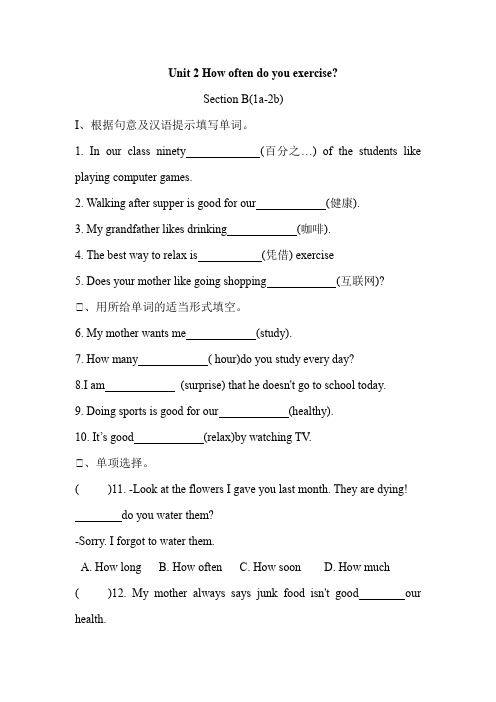
Unit 2 How often do you exercise?Section B(1a-2b)I、根据句意及汉语提示填写单词。
1. In our class ninety (百分之…) of the students like playing computer games.2. Walking after supper is good for our (健康).3. My grandfather likes drinking (咖啡).4. The best way to relax is (凭借) exercise5. Does your mother like going shopping (互联网)?Ⅱ、用所给单词的适当形式填空。
6. My mother wants me (study).7. How many ( hour)do you study every day?8.I am (surprise) that he doesn't go to school today.9. Doing sports is good for our (healthy).10. It’s good (relax)by watching TV.Ⅱ、单项选择。
( )11. -Look at the flowers I gave you last month. They are dying!do you water them?-Sorry. I forgot to water them.A. How longB. How oftenC. How soonD. How much ( )12. My mother always says junk food isn't good our health.A.forB. atC. toD. with( )13. Eating food helps us keep .A. health; healthB. health; healthyC. Healthy; healthD. healthy; healthy( )14. my grandfather is old, he keeps working now.A. Although; butB. But; althoughC. /; althoughD. Although;/( )15. It's good by the Internet.A. relax; useB. relaxing; usingC. to relax; useD. to relax; usingⅡ、根据汉语完成句子,每空一词。
新人教版八年级上册英语第二单元精选练习题附答案

新人教版八年级上册英语第二单元精选练习题附答案Unit 2 How often do you exercise第一课时Section A(1a~2d)01基础过关Ⅰ.根据句意及汉语提示填写单词。
1.My friend sometimes watches movies on the ________(因特网).2.Do you often help your mother do some ________(家务活)3.There are lots of ________(秋千) in the park.4.The bus is ________(满的) of people.5.We went to Hong Kong only ________(一次).Ⅱ.用方框中所给单词的适当形式填空。
6.The old man is so tired that he can ________ walk.7.I visit my grandparents six ________ a year.8.They are all my favorite TV ________.I often watch them.9.His uncle ________ every day. He is very healthy.10.Last year Mary went to Beijing ________—the first time in May and the second time in October.Ⅲ.单项选择。
( )11.—________ does Linda watch English movies—Once a week.A.How often B.How many C.How far D.How long( )12.—What ________ your mother________ on weekends—She usually goes shopping.A.is;do B.does;do C.do;does D.do;do( )13.—May I put the books in the box—I'm afraid not. The box is ________.A.old B.new C.full D.expensive()14.Sport News is my father's favorite ________ and he watches it every night. A.program B.movie C.book D.newspaper( )15.—Would you like a cup of tea—No,thanks. I ________ drink tea.A.ever B.still C.hard D.hardlyⅣ.根据汉语意思完成句子,每空一词。
Unit 2 How often do you exercise教案

Unit 2How often do you exercise?Language Goal【语言目标】Talk about how often you do things:in this unit,students learn to talk about what things they do and howoften they do these things.Knowledge Goals【知识目标】Key Wordshousework,hardly,ever,once twice,full,maybe,least,junk,coffee,health,percent,online,although,through,mind,body,such,together,die,writer,dentist,magazine,however,than,almost,less,pointKey Phraseshow often,on weekends,go to the movies,hardlyever,twice a week,three times a week,be good for,at least,such as,less than,more than Key Sentences1.How often do you exercise?2.What do you usually do on weekends?Key Grammar1.The use of adverbs of frequency.2.“How often”cause of special questions and answers.Ability Goals【能力目标】1.Through the learning to gain the ability to talk abouthow often people do things.2.Write a report about how often people do things.Moral Goals【情感目标】1.Keep a diary every day.2.Do more exercise and develop good habits to keephealthy.Teaching Time【课时】Five periodsPeriod 1Section A(1a-2d)Period 2Section A(Grammar Focus-3c)Period 3Section B(1a-1e)Period 4Section B (2a-2e)Period 5Section B (3a-Self Check)本单元的教学内容围绕“多久做一次运动”这一话题展开。
人教新目标八年级上册英语Unit2 Section B课时训练(2课时 含答案)

Unit 2 How often do you exercise?Section B(1a-2e)词汇积累1.对…有益2.好习惯3.饮食习惯4.喝咖啡5. eat fruit6. every night基础巩固I.用括号内所给词的适当形式填空1. Her dog (die)three days ago.2. It is important (learn)English well.3. Thirty percent of water (be)dirty.4. Most students use the Internet for (fun).5.My (eat) habits are pretty good.II.单项选择( )1. He wants a teacher.A. beB. isC./D. to be( )2. Drinking milk and eating vegetables our health. A. are good for B. are good at C. is good for D. is good with ( )3. my daughter is young, she knows how to make us happy.A. Although; butB. Although;/C./;/D. But; although ( )4. It is very important for us English well.A. learnB. learningC. to learnD. learned( )5. He is late again he got up early this morning.A.orB. andC.becauseD. althoughIII.根据汉语意思及括号内的英文提示,将下列句子译成英语1.你多久去一次学校图书馆?( how often)?2.这部电影非常无聊,我一点也不喜欢。
新人教版八年级上册英语第二单元练习题附答案

新人教版八年级上册英语第二单元精选练习题附答案Unit 2 How often do you exercise第一课时Section A(1a~2d)01基础过关Ⅰ.根据句意及汉语提示填写单词。
1.My friend sometimes watches movies on the ________(因特网).2.Do you often help your mother do some ________(家务活)3.There are lots of ________(秋千) in the park.4.The bus is ________(满的) of people.5.We went to Hong Kong only ________(一次).Ⅱ.用方框中所给单词的适当形式填空。
6.The old man is so tired that he can ________ walk.7.I visit my grandparents six ________ a year.8.They are all my favorite TV ________.I often watch them.9.His uncle ________ every day. He is very healthy.10.Last year Mary went to Beijing ________—the first time in May and the second time in October.Ⅲ.单项选择。
( )11.—________ does Linda watch English movies—Once a week.A.How often B.How many C.How far D.How long( )12.—What ________ your mother________ on weekends—She usually goes shopping.A.is;do B.does;do C.do;does D.do;do( )13.—May I put the books in the box—I'm afraid not. The box is ________.A.old B.new C.full D.expensive()14.Sport News is my father's favorite ________ and he watches it every night. A.program B.movie C.book D.newspaper( )15.—Would you like a cup of tea—No,thanks. I ________ drink tea.A.ever B.still C.hard D.hardlyⅣ.根据汉语意思完成句子,每空一词。
八年级英语Unit2Howoftendoyouexercise教案

Unit 2 How often do you exercise?课时教学设计第一课时Section A (1a-2d)1.通过看图说话、师生问答、听录音、角色扮演等形式,掌握本课时的housework,Internet,program,full,swing这几个词汇和hardly,ever,hardly ever,once,twice 这几个频度副词和短语。
2.通过师生问答、角色扮演、调查采访、做游戏等形式,学会“How often…?”“Iusually…”等句子结构,并能用之谈论、描述自己或他人的业余活动,同其他人交流与业余活动有关的信息,谈论自己或他人进行某项活动的频率。
重点使学生掌握与业余活动相关的英语词汇及本课时的句型“What do you usually do on weekends?”“I always exercise.”“How often do you…?”“I…once a week.”让学生了解世界上其他国家人们的业余活动情况。
难点让学生运用所学语言项目How often do you…?谈论自己或他人的业余活动及其频率。
Step 1 情景导入通过师生自由交际进行复习与热身。
让学生回忆关于业余活动的词汇,例如watch TV, read books,exercise, go shopping,go to the movies等。
通过师生谈论自己的业余活动,调动学生对本课话题的学习兴趣,同时实现新旧知识的衔接,巩固已学知识,并引出本节课的学习话题。
For example:T:What do you usually do on weekends?S1:I usually help with housework.S2:I usually play basketball with my friends.S3:I usually go shopping.T:Do you usually go shopping on weekends?S1:Yes,I do.T:So do I.S2:OK.After class we'll go shopping.T:Do you usually watch TV on weekends?S3:No,I don't. I usually read a book.…(设计意图:本环节通过回忆以前学过的词汇进行课前热身,让学生打开记忆的大门,快速激活已有的知识库存,为下一环节的学习奠定基础。
人教版英语八年级上册Unit 2 How often do you exercise SectionB (1a-2e) 教案
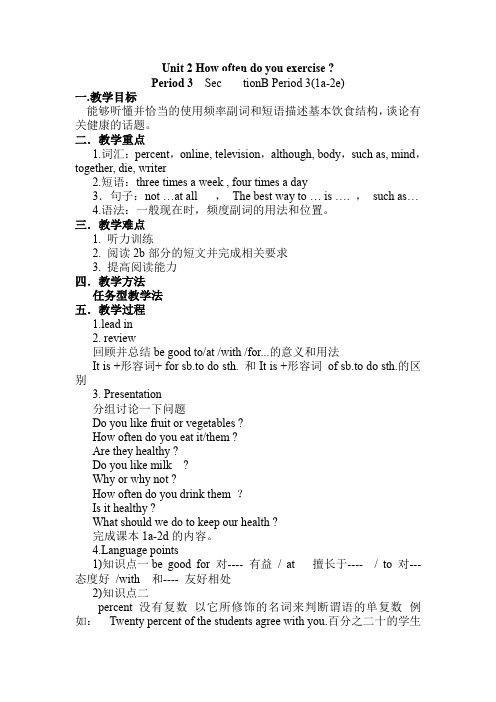
Unit 2 How often do you exercise ?Period 3 Sec tionB Period 3(1a-2e)一.教学目标能够听懂并恰当的使用频率副词和短语描述基本饮食结构,谈论有关健康的话题。
二.教学重点1.词汇:percent,online, television,although, body,such as, mind,together, die, writer2.短语:three times a week , four times a day3.句子:not …at all ,The best way to … is …. ,such as…4.语法:一般现在时,频度副词的用法和位置。
三.教学难点1. 听力训练2. 阅读2b部分的短文并完成相关要求3. 提高阅读能力四.教学方法任务型教学法五.教学过程1.lead in2. review回顾并总结be good to/at /with /for...的意义和用法It is +形容词+ for sb.to do sth. 和It is +形容词of sb.to do sth.的区别3. Presentation分组讨论一下问题Do you like fruit or vegetables ?How often do you eat it/them ?Are they healthy ?Do you like milk ?Why or why not ?How often do you drink them ?Is it healthy ?What should we do to keep our health ?完成课本1a-2d的内容。
nguage points1)知识点一be good for 对---- 有益/ at 擅长于---- / to 对--- 态度好/with 和---- 友好相处2)知识点二percent 没有复数以它所修饰的名词来判断谓语的单复数例如:Twenty percent of the students agree with you.百分之二十的学生赞同你Thirty percent of time passes.百分之三十的时间过去了。
2018年秋人教版英语八年级上册导学案:Unit 2 How often do you exerc

①How often do you watch TV?
②What’s your favorite program?
③Do you drink milk?
Answers: Students.
①Hardly ever.
②Sports news.
③Yes,I do.Every day.
S3:Yes,it is.
环节说明:教师恰当地使用教具和PPT进行教学,这样教学手段直观。
Step 2完成教材1a—1b的任务。(2分钟)
1.要求学生将1a的单词读一遍。
2.要求学生将单词与图片配对。(见多媒体)
3.教师边出图片,边对答案。
参考案例
环节说明:学生先看,后做,老师边出示图片,边对答案,这样及时,乐学。也使得教学步骤严谨有序,符号学生的认知规律。
小结训练(见多媒体)
根据汉语提示完成句子。
1.我妈妈想要我喝牛奶。
My motherwants metodrinkmilk.
2.你有好习惯吗?
Do you havegoodhabits?
3.—你如何吃水果?—有时吃。
—How often do youeatfruit?
—Sometimes.
Step 4布置作业
1.看3b。
2.试着写出3b中的问句。
参考案例(见多媒体)
环节说明:学生做好后,应及时予以检查与评价,尤其应注意句子的符号及单词的大小字母。
3.要求学生分组讨论3c。
4.写出讨论的结果。
小结训练(见多媒体)
根据汉语提示完成句子。
1.—他们如何熬夜?
—从来不。
—How often do theystay up late?
Unit 1 How often do you exercise Section B(1a-2c)
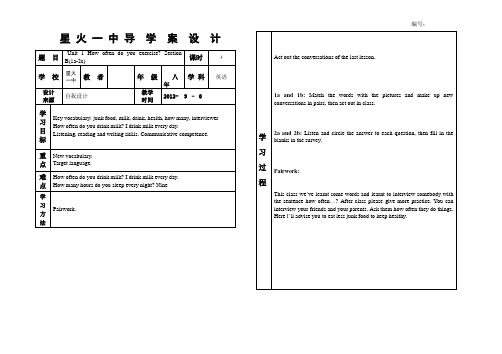
2a and 2b:Listen and circle the answer to each question, then fill in the blanks in the survey.
Pairwork:
This class we’ve learnt some words and learnt to interview somebody with the sentence how often…? After class please give more practice. You can interview your friends and your parents. Ask them how often they do things. Here I’ll advise you to eat less junk food to keep healthy.
星火一中导学案设计
题目
Unit 1 How often do you exercise? Section B(1a-2c)
课时
4
学校
星火
一中
教者
年级
八年
学科
英语
设计
来源
自我设计
教学
时间
2012- 9 – 6
学
习
目
标
Key vocabulary: junk food, milk, drink, health, how many, interviewer
5.Good eating habits help yougood grades.(get)
人教版初二英语上册Unit 2 How often do you exercise单元教案

第一课时Section A (1a~2d)【学习目标】1.学生能掌握六个频率副词的用法。
2.学生能听懂谈论各项活动的对话;学会用英语谈论做各项活动的频率。
3.通过完成各项活动,学生能够养成团结协作的意识,并能合理利用时间。
【学习重点】学生能够学会用六个频率副词谈论做各项活动的频率。
【学习难点】通过交流表达和听力训练,掌握六个频率副词Learning action tips:Play the video about students' activities on weekends in class. Let students watch it.Task 1Learning action tips:Preview the words on Page2 in the word list. Students read the words by phonetic symbols, then underline new words in the text and mark the Chinese meaning. At last finish the task in 1a.【知识链接】▲once,twice,three times等次数的表达法(1)这三个词都表示次数,once是一次,twice是两次,除了一次、两次,其他的次数都用“数字+times”表达。
如:三次是three times,五次是five times。
(2)这些表达数的词后与一段时间连用,表示动作多长时间发生几次,即动作的频率。
【导练】(1)我一周看一次电视。
I watch TV once a week.(2)我每天读三次英语。
I read English three times__ a day.情景导入生成问题T:What do you usually do on weekends?S1:I usually play basketball.S2:I often go shopping.S3:I sometimes help my parents with housework.自学互研生成能力Task 1Let's read new words and the phrases.1.I can read.(我会读)housework,once,twice,Internet,program,always,usually,often,sometimes,hardly ever,never2.I can write.(我会写)翻译下列短语和句子。
八年级英语听力翻译和课文翻译
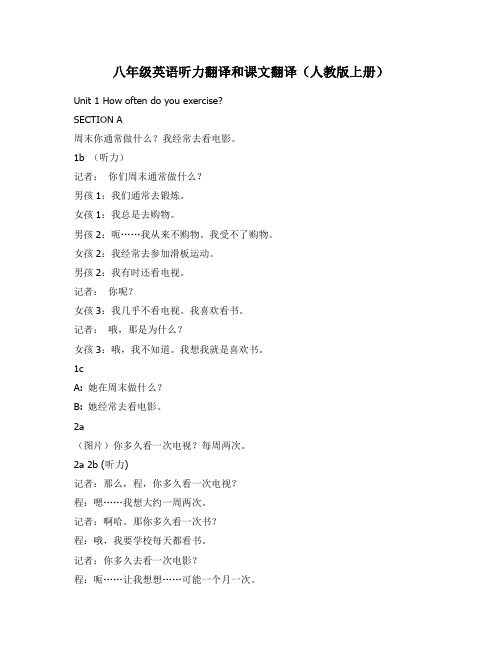
八年级英语听力翻译和课文翻译(人教版上册)Unit 1 How often do you exercise?SECTION A周末你通常做什么?我经常去看电影。
1b (听力)记者:你们周末通常做什么?男孩1:我们通常去锻炼。
女孩1:我总是去购物。
男孩2:呃……我从来不购物。
我受不了购物。
女孩2:我经常去参加滑板运动。
男孩2:我有时还看电视。
记者:你呢?女孩3:我几乎不看电视。
我喜欢看书。
记者:哦,那是为什么?女孩3:哦,我不知道。
我想我就是喜欢书。
1cA: 她在周末做什么?B: 她经常去看电影。
2a(图片)你多久看一次电视?每周两次。
2a 2b (听力)记者:那么,程,你多久看一次电视?程:嗯……我想大约一周两次。
记者:啊哈。
那你多久看一次书?程:哦,我要学校每天都看书。
记者:你多久去看一次电影?程:呃……让我想想……可能一个月一次。
记者:你多久锻炼一次?程:哦,我大约一周锻炼三次。
记者:你多久购物一次?程:购物?我大约……大约一个月购物两次。
2cA: 你多久看一次电视?B: 我每天看电视。
A: 你最喜欢什么节目?B: 《动物世界》。
A: 你多久看一次?Grammar Focus你周末通常做什么?我通常踢足球。
他们周末做什么?他们经常去看电影。
他周末做什么?他有时看电视。
你多久购物一次?我每月购物一次。
程多久看一次电视?他每周看两次电视。
3格林中学学生做什么?大多数学生每周锻炼三或四次。
一些学生每周锻炼一两次。
一些学生非常活跃,每天都锻炼。
至于家庭作业,大多数学生每天都做家庭作业。
一些学生每周做三或四次家庭作业。
没有学生每周做一两次作业。
关于“看电视”的结果很有趣。
一些学生每周看一两次电视,一些学生每周看三或四次电视。
但大多数学生每天都看电视。
4A: 你多久读一次英语书?B: 我每周读两次英语书。
SECTION B1a垃圾食品牛奶水果蔬菜睡觉咖啡1bA: 刘芳,你多久喝一次牛奶?B: 我每天喝牛奶。
Unit 2 How often do you exercise 教案 人教版八年级英语上册

知识目 标 教学目 能力目 标 标
exercise?
Focus-3c)
课型
New
1. 学习并掌握下列词汇:maybe, least
2. 复习运用频率词汇及询问活动频率。
3. 一般现在时态的熟练运用。
能够运用频率副词谈论事情发生的频率。
情感目 养成健康的饮食习惯, 保证充足的睡眠时间, 进行合理的运
Work on 2. Students work with a
conversation.
2d partner and act out the
2. Role play it.
conversation.
3. Some explanations in 2d.
通过口语结 对活动, 在交 流信息过程 中, 进行真实 的交际问答 活动。
Unit 2 How often do you exercise?
课 题 Unit 2 How often do you exercise?
课时 课型
第一课时 Section A(1a2d) New
1. 能掌握以下单词:housework, hardly, ever, hardly ever,
教学目 标
Students first read the
组对话, 让学
conversation in pairs, then 生从听对话
make similar conversations about vacation.
到模仿对话, 练习频率副
词的运用。
Work on 2a: 1. Let students read the phrases in the chart. Step 5 2. Tell students that Cheng Listening Tao is taking about how 2a&2b often he does these activities. 3. Play the tape. Work on 2b:
人教八年级英语上册Unit2单元教案

2)频度副词的用法:always; usually ; often ; sometimes; hardly ever; never
教学难点:1)第三人称单数谓语动词在此核心句型中的运用。
2)能够谈论课余时间的各项活动,以及初步认识和使用频率副词。
—He usually watches TV.
—How often do you watch TV?
—I watch TV every day.
—Does he go shopping?
—No, he never go shopping.
教
学
预
设
过
程
Ⅰ. Lead in
Talk about yourlast weekend’s activities.
学校
三中
学科年级
八年英语
课型
新授课
课时
1
主备人
张晓林
检查人
教研组长
设计时间
2014.8
修改时间
2014.9
课题:Unit 2 How often do you exercise?Section A1(1a-2d)
教学目标:1.语言知识目标:
1)能掌握以下单词:housework, hardly, ever, hardly ever, once, twice, Internet, program, full, swing, swing dance, maybe, least, at least
课前准备:PPT andLearning Guide
板
书
人教pep版八年级英语上册 Unit2Howoftendoyouexercise第3课时SectionB1a_2b课时测试题
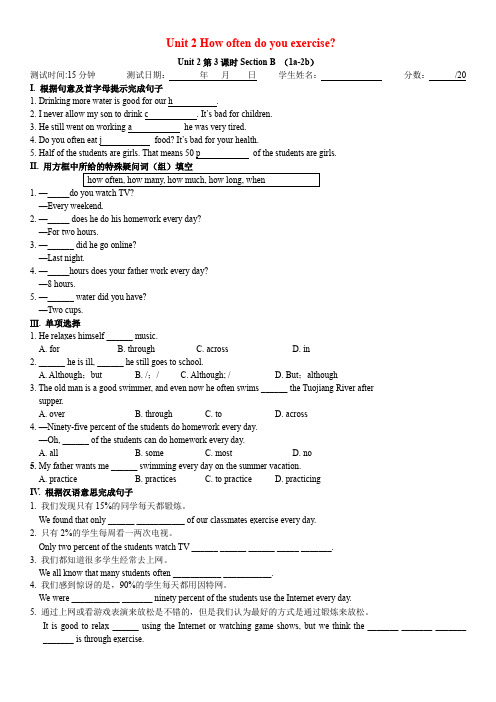
Unit 2 How often do you exercise?Unit 2第3课时Section B (1a-2b)测试时间:15分钟测试日期:年月日学生姓名:分数:/20I. 根据句意及首字母提示完成句子1. Drinking more water is good for our h .2. I never allow my son to drink c . It’s bad for children.3. He still went on working a he was very tired.4. Do you often eat j food? It’s bad for your health.5. Half of the students are girls. That means 50 p of the students are girls.II.1. ——Every weekend.2. —_____ does he do his homework every day?—For two hours.3. —______ did he go online?—Last night.4. —_____hours does your father work every day?—8 hours.5. —______ water did you have?—Two cups.Ⅲ. 单项选择1. He relaxes himself ______ music.A. forB. throughC. acrossD. in2. ______ he is ill, ______ he still goes to school.A. Although;butB. /;/C. Although; /D. But;although3. The old man is a good swimmer, and even now he often swims ______ the Tuojiang River aftersupper.A. overB. throughC. toD. across4. —Ninety-five percent of the students do homework every day.—Oh, ______ of the students can do homework every day.A. allB. someC. mostD. no5. My father wants me ______ swimming every day on the summer vacation.A. practiceB. practicesC. to practiceD. practicingIV. 根据汉语意思完成句子1. 我们发现只有15%的同学每天都锻炼。
人教版Unit2Howoftendoyouexercise教案
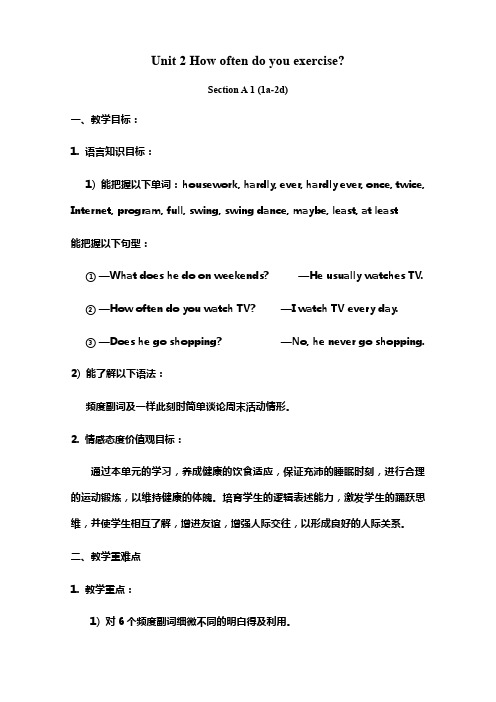
Unit 2 How often do you exercise?Section A 1 (1a-2d)一、教学目标:1. 语言知识目标:1) 能把握以下单词:housework, hardly, ever, hardly ever, once, twice, Internet, program, full, swing, swing dance, maybe, least, at least能把握以下句型:① —What does he do on weekends? —He usually watches TV.② —How often do you watch TV? —I watch TV every day.③ —Does he go shopping? —No, he never go shopping.2) 能了解以下语法:频度副词及一样此刻时简单谈论周末活动情形。
2. 情感态度价值观目标:通过本单元的学习,养成健康的饮食适应,保证充沛的睡眠时刻,进行合理的运动锻炼,以维持健康的体魄。
培育学生的逻辑表述能力,激发学生的踊跃思维,并使学生相互了解,增进友谊,增强人际交往,以形成良好的人际关系。
二、教学重难点1. 教学重点:1) 对6个频度副词细微不同的明白得及利用。
2) 弄清一样此刻时在不同人称下动词形式及提问的转变。
2. 教学难点:1) 第三人称单数谓语动词在此核心句型中的运用。
2) 谈论课余时刻的各项活动,和初步熟悉和利用频率副词。
三、教学进程Ⅰ. Warming upTalk about your last weekend’s activities.Ⅱ. Presentation(1) 教师问:“What do you usually do on weekends ? ” (而且板书)让学生依照自己的实际回答I usually …… on weekends.(2) 教师出示动词卡片watch TV,read books,exercise,swim, play football、go shopping、go to movies让学生回答。
八年级英语上册《Unit1 How often do you exercise Section B 1a-2c》学案(无答案) 牛津版
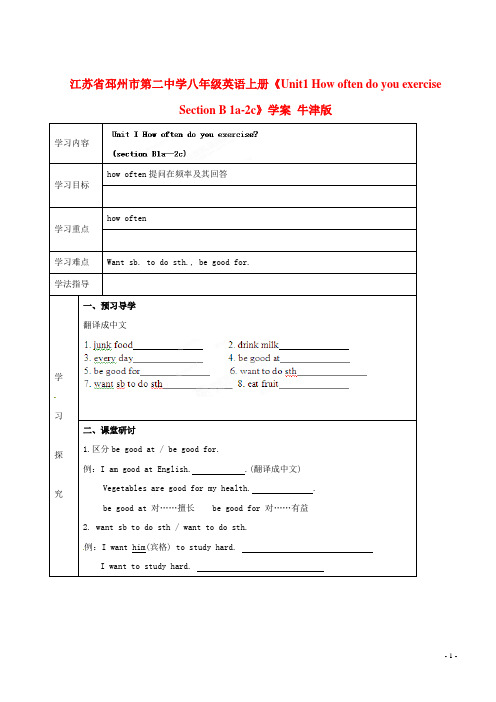
I want to study hard.
三、拓展提升
1. b e bad for
垃圾食品对健康有害。Junk foodhealth.
2. be good for
牛奶对我们的健康有益。Milkour health.
当堂检测
一、单项选择
( )1.do you eat vegetables? I hardly ever eat vegetables.
A. What B. How much C. How often D. When
( )2. Miss Chen wantsto study hard.
A. we B. he C once a week? Yes. She.
A. How often; everyday B. Do; do C. Do; don’t D. Does; does
学
习
探
究
一、预习导学
翻译成中文
二、课堂研讨
1.区分be good at / be good for.
例:I am good at English..(翻译成中文)
Vegetables are good for my health..
be good at对……擅长be good for对……有益
2. want sb to do sth / want to do sth.
you eat junk food?
3.牛奶对我们的健康有益 。
Milk our health.
教学反思
( )4. Milk is goodmy health.
A. at B. of C. on D. for
【人教版八年级英语上册教案】Unit2SectionB1a~2b
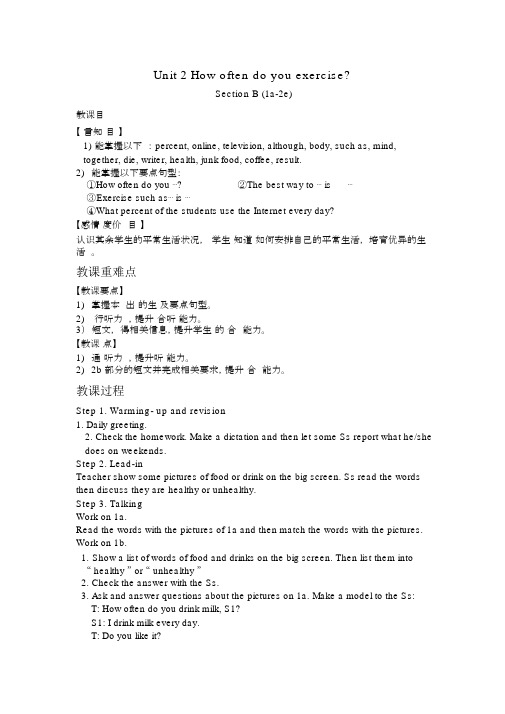
Unit 2 How often do you exercise?Section B (1a-2e)教课目【言知目】1) 能掌握以下: percent, online, television, although, body, such as, mind, together, die, writer, health, junk food, coffee, result.2)能掌握以下要点句型:①How often do you ⋯?②The best way to⋯ is⋯③E xercise such as⋯ is ⋯④What percent of the students use the Internet every day?【感情度价目】认识其余学生的平常生活状况,学生知道如何安排自己的平常生活,培育优异的生活。
教课重难点【教课要点】1)掌握本出的生及要点句型。
2)行听力,提升合听能力。
3)短文,得相关信息,提升学生的合能力。
【教课点】1)通听力,提升听能力。
2)2b 部分的短文并完成相关要求,提升合能力。
教课过程Step 1. Warming- up and revision1.Daily greeting.2.Check the homework. Make a dictation and then let some Ss report what he/she does on weekends.Step 2. Lead-inTeacher show some pictures of food or drink on the big screen. Ss read the words then discuss they are healthy or unhealthy.Step 3. TalkingWork on 1a.Read the words with the pictures of 1a and then match the words with the pictures. Work on 1b.1.Show a list of words of food and drinks on the big screen. Then list them into“ healthy ” or “ unhealthy ”2.Check the answer with the Ss.3.Ask and answer questions about the pictures on 1a. Make a model to the Ss:T:How often do you drink milk, S1?S1: I drink milk every day.T: Do you like it?’ s good for my health.S1: No, but my mother wants me to drink it. She says it4. Make conversations by themselves and show in front of class.Step 4. ListeningWork on 1c:1.Tell Ss that a reporter is interviewing Bill and Tina what their eating habits are.Listen to the recording and find the answers to these two questions: Is Billhealthy? Is Tina healthy? Listen two times and find the answers2.Check the answers together.1.Let one student read the sentences and try to know the meaning of the sentences.2.Play the first time, Ss just listen. Play the tape for the second time for the Ssto listen and find the answers.3.Check the answers together.听力指:学生先要抓住六个的意思。
人教版新目标英语八年级上unit2教案
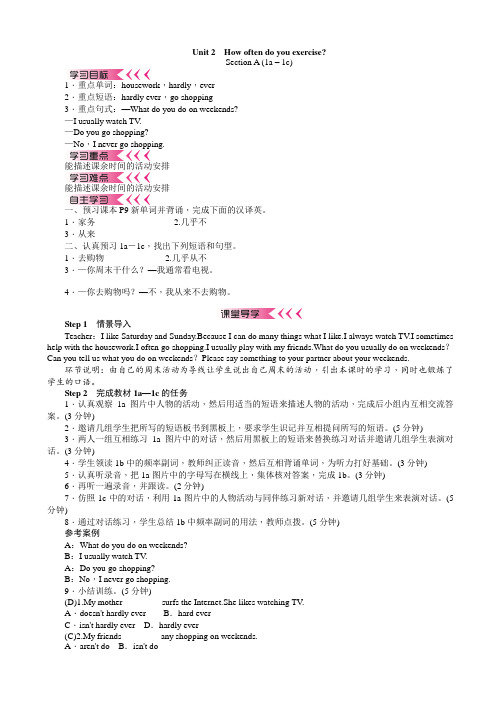
Unit 2How often do you exercise?Section A (1a-1c)1.重点单词:housework,hardly,ever2.重点短语:hardly ever,go shopping3.重点句式:—What do you do on weekends?—I usually watch TV.—Do you go shopping?—No,I never go shopping.能描述课余时间的活动安排能描述课余时间的活动安排一、预习课本P9新单词并背诵,完成下面的汉译英。
1.家务____________ 2.几乎不____________3.从来____________二、认真预习1a-1c,找出下列短语和句型。
1.去购物____________ 2.几乎从不____________3.—你周末干什么?—我通常看电视。
________________________________________________________________________4.—你去购物吗?—不,我从来不去购物。
________________________________________________________________________Step 1情景导入Teacher:I like Saturday and Sunday.Because I can do many things what I like.I always watch TV.I sometimes help with the housework.I often go shopping.I usually play with my friends.What do you usually do on weekends?Can you tell us what you do on weekends?Please say something to your partner about your weekends.环节说明:由自己的周末活动为导线让学生说出自己周末的活动,引出本课时的学习,同时也锻炼了学生的口语。
Unit 2 How often do you exercise
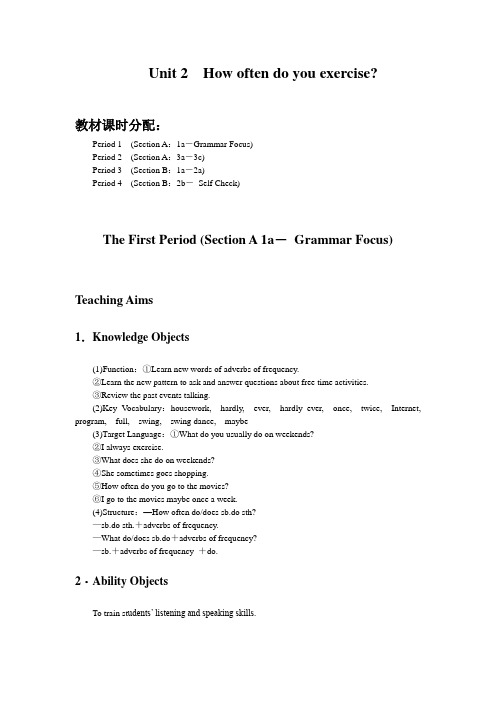
Unit 2How often do you exercise?教材课时分配:Period 1(Section A:1a-Grammar Focus)Period 2(Section A:3a-3c)Period 3(Section B:1a-2a)Period 4(Section B:2b-Self Check)The First Period (Section A 1a-Grammar Focus) Teaching Aims1.Knowledge Objects(1)Function:①Learn new words of adverbs of frequency.②Learn the new pattern to ask and answer questions about free time activities.③Review the past events talking.(2)Key Vocabulary:housework, hardly, ever, hardly ever, once, twice, Internet, program, full, swing, swing dance, maybe(3)Target Language:①What do you usually do on weekends?②I always exercise.③What does she do on weekends?④She sometimes goes shopping.⑤How often do you go to the movies?⑥I go to the movies maybe once a week.(4)Structure:—How often do/does sb.do sth?—sb.do sth.+adverbs of frequency.—What do/does sb.do+adverbs of frequency?—sb.+adverbs of frequency +do.2.Ability ObjectsTo train st udents’ listening and speaking skills.3.Moral Objects(1)To be interested in taking part in kinds of activities in an English class.(2)To raise students’ interest of learningEnglish.Teaching Key Points1.Key Vocabulary in this period.2.Target language in this period.Teaching Difficult Points1.How to improve students’listening ability.2.Make conversations using the key structures.3.How to remember words well.Teaching ProceduresStep 1Leading in (about 3 minutes)Review the pattern learned last class.Let some students to make sentences using past tense.Start the class.T:T oday we will learn some new patterns using adverbs of frequency.Let’s get started.Write the patterns on the blackboard.Step 2Presentation (about 5 minutes)Have students look at the picture.Then ask a pair of students to read the dialogue in the picture.T:Please turn to page 9 and look at the picture of 1a.Then, I want some of you to read the dialogue.Object:Get students familiar with the patterns and try to make sentences using the new patterns.Attention:If students have trouble in making sentences.Teacher can give students some minutes to discuss with their classmates.After making a sentence, teacher can give some suggestions or give an example before their own sentences.Step 31a (about 5 minutes)Read the instructions.Ask students to make a list of the weekend activities.T:After making sentences, let’s finish the activity 1a together.Please look at the picture of 1a and think.Make a list of the weekend activities.If you have problems in making this list, you may refer to the pictures in 1a.Maybe you have the similar activities with the people in picture.I will give you several minutes to finish this activity.After finishing the activity, ask someone to share the answer.And then, check the answer.Object:Make students be more familiar with the words by relating to pictures.Attention:Control the time properly.Step 41b (about 5 minutes)T:Let’s do the 1b together.Now, you can see the adverbs of f requency below.I believe you’ve known the meaning of these words and phrases.So, please listen to the recording and write the activities from the pictures above on the lines below.Please pay attention to the differences between “usually”and “often”.Now, listen to the tape.Play the recording the first time.This time students only listen.When play it the second time, say, This time, make up your answer.Make sure students understand what to do....After finishing the activity, ask someone to share the answer.And then, check the answer.Objects:Training students’ listening skills and the abilities to distinguish different adverbs of frequency.Attention:If students have trouble in listening, the teacher can play it again.Step 51c (about 5 minutes)Let students read the dialogue in the blank.Let students make their own dialogues using the same patterns.T:Let’s do the practice together.First, I want one of you to read the dialogue of 1c.Then form into groups and make your own conversations like this.Remember to use our new patterns.When students work, walk around the room checking the progress.T:OK, stop here.Who wants to share your conversations with all of us?S1:What does Sam do on weekends?S2:He usually stays at home and does his homework.S1:Does he go to the cinema?S2:No, he never watches movies.T:Good job!Object:Improving the oral skills of students.Attention:If students have trouble in pronunciation, teacher should give some directions.Step 62a (about 5 minutes)T:You guys did really well in last activity.Now, turn to page 10 and we will finish the activity 2a together.There are two columns in the box.The left is about activities, while the right is about adverbs of frequency.It is a match practice according to the tape.Now I’ll play the recording.Play the recording the first time.This time students only listen.When play it the second time, say, this time number the words.Make sure students understand what to do.After finishing the activity, ask someone to share the answer.And then, check the answer.Step 72b (about 5 minutes)Listen and match the activities in 2a with how often Cheng Tao does them.T:I’ll play the recording again.Listen and try to finish the 2b activity.Before I play the recording, I will give you one minute to read the words and phrases in 2a again.One minute later...T:Now I’ll play the recording.After finishing the activity, ask someone to share the answer.And then,check the answer.Step 82c (about 3 minutes)Read the dialogues on the right.Ask students finish the blank and make dialogues in their exercise book after class.T:Pretty good for your behavior.Then, we’ll see the activity 2c together.I will ask two of you to read the dialogues on the right.S1 and S2, please.S1 and S2 read the dialogues.T:I’m sorry we have limited ti me in our class.So I wish you guys make the conversation and write them down on your exercise book after class.I will check your work next class.Objects:Training students’ comprehension and writing skills.Attention:If there is enough time, the teacher can ask more students to share their conversation in class.Step 92d (about 5 minutes)T:What will you say when you want to know what other people usually do every day?And what do you think foreigners will do in their daily life?Maybe after today’s role p lay, you will find the answer.Please form into groups and I will give you several minutes to prepare for the performance.Give students a few minutes to work in pairs.When they work, walk around the room checking the progress.At the end ask several pairs of students to role play the conversation.Step 10Grammar Focus (about 2 minutes)Have students read the grammar box first.Point out the frequency adverbs and introduce the differences between these words briefly.Let some students read the dialogues and make their own sentences using these frequency adverbs.Attention:Control the time properly.Step 11Summary and Homework (about 2 minutes)T:Today we have learned many new words of adverbs of frequency.And we also learned how to ask and answer questions about free time activities.Then remember your homework:Make conversations with your partner.Write a short conversation.Class is over.See you next time.Blackboard DesignUnit 2How often do you exercise?The First Period(Section A 1a-Grammar Focus)Key Vocabulary:housework, hardly, ever, hardly ever, once, twice, Internet, program, full, swing, swing dance, maybeStructure:How often do/ does sb.do sth?sb.do sth.+adverbs of frequency.What do/ does sb.do+adverbs of frequency?sb.+adverbs of frequency +do.第一课时作业设计单项选择。
- 1、下载文档前请自行甄别文档内容的完整性,平台不提供额外的编辑、内容补充、找答案等附加服务。
- 2、"仅部分预览"的文档,不可在线预览部分如存在完整性等问题,可反馈申请退款(可完整预览的文档不适用该条件!)。
- 3、如文档侵犯您的权益,请联系客服反馈,我们会尽快为您处理(人工客服工作时间:9:00-18:30)。
新目标英语八年级上Unit 1 How often do you exerciseSection A说课教案1a ---1c·教材分析:本单元以“How often do you exercise ?”为话题展开教学活动。
首先学会恰当地使用频率副词及短语,再学会描述课余时间的活动安排和基本饮食结构。
通过复习七年级学习过的动词短语,及本单元的听力练习,各种方式的口语交际活动和写作练习,使学生积极参与,合作,从而培养学生的综合语言运用能力。
教材在本单元的开篇,即本课时,安排了关于谈论课余时间的各项活动,以及初步认识和使用频率副词,为进一步地使用频率副词及动词短语做语言知识上的准备。
教学目标:A:语言目标:恰当使用always usually often sometimes hardly ever never等频率副词和日常活动短语:watch TV go shopping read books exercise等。
掌握句型:What do you usually do on weekends? I often go to themovies.What does she do on weekends ?She often goes to the movies.B:能力目标:学习描述课余时间的活动安排,初步培养学生的语言综合运用能力。
C:德育目标:培养学生的逻辑表述能力,激发学生的积极思维,并使学生互相了解,增进友谊,加强人际交往,以形成良好的人际关系。
教学重点:核心句型:What do you usually do on weekends?I often go to the movies.教学难点:第三人称单数谓语动词在此核心句型中的运用。
教学用具:词汇卡片多媒体课件一套教学过程:Step1 Warm-up activities(1) Do it (学生按教师的指令做动作)T:Read books. / Do homework!/ Draw pictures/ Look at the blackboard T: run / stop / stand up / sit down.(2) Do as I do.(学生跟老师边说边做动作)I read books on weekends.I run on weekends.I do my homework on weekends.Step 2 Revision and presentation(1)教师问:“What do you usually do on weekends ? ” (并且板书)让学生根据自己的实际回答I usually …… on weekends.(2)教师出示动词卡片watch TV、read books 、exercise 、clean、skateboard、play basketball、wash clothes、go shopping、go to movies 让学生认读。
(3)做游戏:“ What’s missing?” (学生先把动词卡片全部读一遍,教师从卡片中任意抽掉一张,再让学生看卡片读动词短语,然后让学生说出抽掉的是哪一张词汇卡片。
)Step 3 Pattern drill and dialogue(1)出示词汇卡片给学生,并提问:“What do you usually do on weekends?” 引导学生回答:I usually …… on weekends.(2)Task one “Find my group members.”在规定时间内填完活动表格,再向周围同学开始询问,找出与自己课外活动大致相同的同学请他或她在每项活动后面签名。
Activity Name(3)Look at the picture on the book ,name each activity .Then ask students to point to each picture , ask and answer in pairs . “What ’s the boy/girl doing ? ” “He/She is reading .” Check the answ ers on the blackboard and ask students to correct their own activities.(1a )Step 4 Presentation and drill(1)教师指着屏幕说:“ Now let’s see my activities on weekends. 屏幕上出现各项活动的图片并介绍。
I always read books at 6:00 in the morning. Then I usually run at 6:30. I often clean my house in the afternoon. Sometimes I watch TV, but I never watch TV too much. I hardly ever go to the movies.(2)点击鼠标屏幕上出现频率副词及相关的百分比。
always(100%) usually(80%) often (30-50%)sometimes(20%) hardly ever(5%) never(0%)领读频率副词,让学生快速认读。
(3)分别点击活动图片,每个图片正面出现一个频率副词。
教师依次提问:What do you do on weekends?引导学生用图片中的活动及副词回答,如:I usually run.(4)Task Two: Making cards每个学生把自己的课外活动做成卡片,再把频率副词做成卡片,然后一个学生问What do you do on weekends? 另一个学生分别拿一张活动卡片和频率卡片并用其进行回答。
Step 5 Practice and drill(1)Play the recording the first time .Students only listen . Play the recording a second time . Point to the pictures . This time say , Listen to the conversation and write the letter of one activity (a through e )after the word in the list .(1b)(2) 屏幕上出现一张一个女孩读书的图片,教师提问:What does she do on weekends?再点击图片出现副词often 引导学生回答She often reads books. (3) 点击屏幕出现A:What do you do on weekends?B: I often read books.C: What does she do ?D: She often reads books/(4) 点击图片出现活动图片,四人小组练习对话。
(5) Task three: Do a survey “What does she /he do on weekends ?”Name Activity How oftenStep 6 Homework(1) Make a conversation “What do you usually do after school ?” in groups.(2) Collect some information about your favorite teacher with your partners ,such as his or her personality , hobby , eating habit and so on . Then introduce this teacher to us .教学板书设计:Unit 1. How often do you exercise ? 1a-----1cA: What do you usually do on weekends?B: I often go to the movies.教学策略:根据本课时的特点,我安排了六个环节,第一个环节让学生按老师的指令做动作来调整学生的精神状态,同时又复习了一些动词,为新课做知识上的准备;在第二个环节中,通过复习旧句型“Wha t do you usually do on weekends ? ”,引出了七年级曾学过的频率副词usually和一些动词短语,减轻学生学习新课的难度;第三环节,通过完成课本Activity 1a和Task 1来加强说和写的能力的培养;第四环节出现了本课时的重点,因为句型已掌握熟练,这些重点内容——新频率副词的使用,也迎刃而解,再通过Task Two: Making cards这一有趣的活动来加深理解;第五环节,是我在教学中的扩展和延伸,在完成课本Activity 1b和Task3的过程中,把学生们学习一般现在时态的难点,用对比的方式清楚地呈现给学生,使学生充分感知和理解,使学生在交际中对语言的认识得到升华。
在第六环节中,我安排了编对话活动来加强听说能力的培养,第二题是一个开放性的作业,在锻炼学生的综合语言运用能力的同时,又让他们学会合作与交流。
在本课的整个教学过程中,教学重点内容(1c)贯穿始终,这是在教学实际中对教材的调整,由于本课教材没有涉及到一般现在时态的单三形式,而它又是中学生学习英语易疏忽的问题,所以我在本课做了补充。
【上一篇】【下一篇】【发表评论】【推荐给朋友】【我有更好的资料】。
